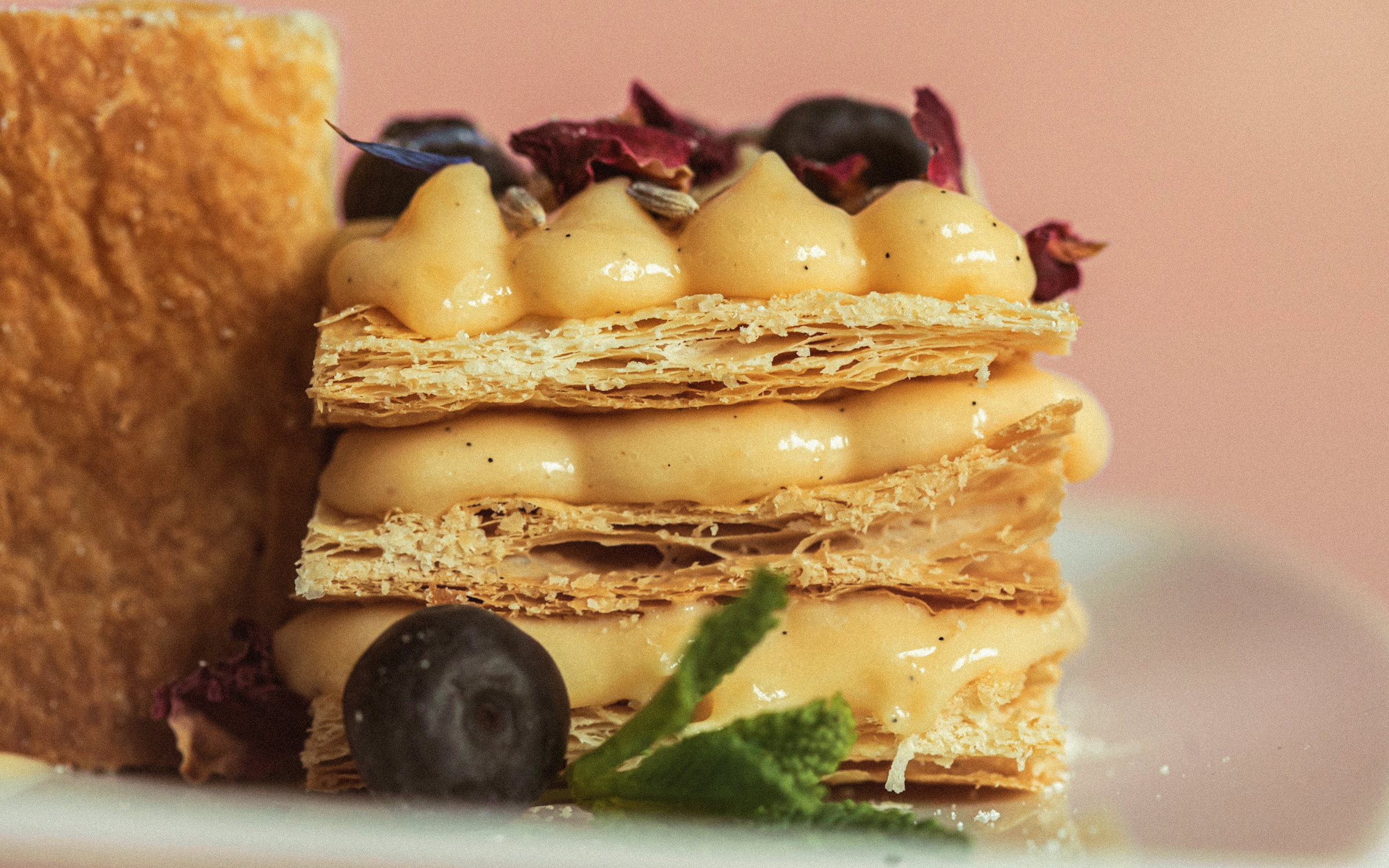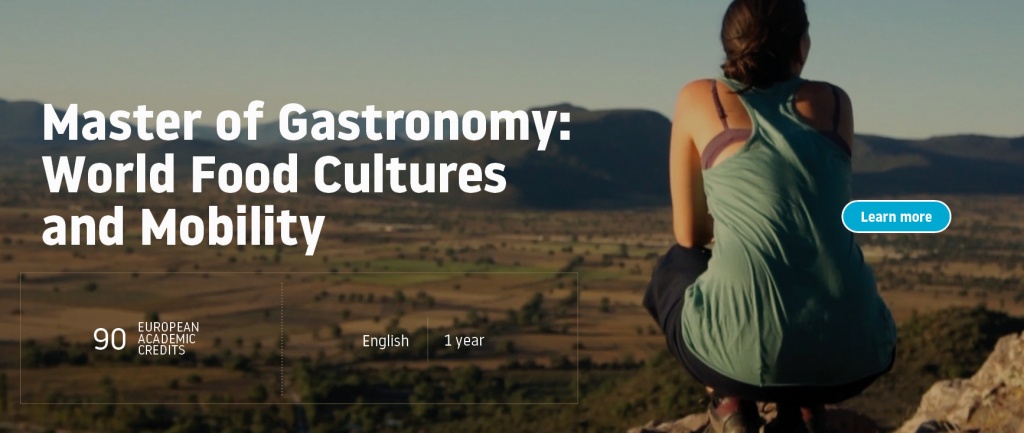The New Gastronome
Rememberance Through Food
by Deines Rosibel Rojas Loaiza
by Deines Rosibel Rojas Loaiza

Growing up, I was a picky eater. However, my mom never forced me to eat – she had a different technique. She would place a “Milhojas” (Mille-Feuille) on the other side of the table, knowing that it was my weakness. Most times, it worked. Suddenly, I would fight my way through obstacles like broccoli, or worse, onions, as if I was Mario trying to rescue Princess Peach. Sometimes, though, not even that kind of motivation was enough. I had strong eating principles.
Those layers of flaky puff pastry filled with pastry cream were all I desired as a child. No fork needed; I would just take a big bite to break the crunchy layers followed by that heavenly sweet and starchy vanilla cream. It usually ended with sticky cheeks and clothes full of powdered sugar. Today, I still remember those bites with a joy and satisfaction usually reserved only for kids who have not a single worry in the world.
At the time, however, I did have one worry: onions. Picture the tense scene between my mother and my seven-year-old self, crying a torrent of fake tears that could have easily won me the Academy Award for Best Performance. All of that, because of onions. For some reason, the crunchiness of raw onion reminded me of a cockroach being squashed by a shoe. Hence, the drama. It took me twenty-one years, graduating from University and moving out of my parent’s house to a different city, to finally eat my first onion. After two weeks of pre-cooked meals, I got an onion from the supermarket and thought, “this thing is popular for a reason”. So, I braved it, bought it, and the rest is history. Since then, I always have them in my kitchen and even harvested some. But you see, this is not a story about onions. It is a story about food and memory and the way their joined force hits us in the face when we least expect it.
Years ago, when I moved out of my parent’s house, unfortunately, I could not pack any cooking abilities. Unlike all those heartwarming stories of people who grew up cooking with their grandmothers and learning the family recipes, I would manage to burn water if it was possible. Those skills flourished later on thanks to necessity and the help of a famous YouTuber since I had failed to understand my mom’s instructions on how to make her perfect rice over the phone.
Whenever I visit my family, my mom asks me: “What do you want me to cook for you?” The answer never changed: “I want pancakes for dinner.” Soon, I would be sitting on the kitchen counter while she pampered me and told me the latest gossip of the block. The fragrant scent of vanilla flooded the kitchen, and the sound of a carrot being grated formed the background to our chat. Carrot? Yes, you read right! Even though I was no longer a picky eater, my mother never lost her habit of sneaking a secret veggie into my meals. By then, I was able to cook whole feats, but these simple pancakes meant so much more. Yet, before I even noticed, years went by, and the pancake nights disappeared. Eventually, I would move even further away – to another country, to another continent.
“Not so long ago, during a layover in Paris, I made it my mission to stop in every bakery to buy the famous Parisian macarons. Yet, somehow, I ended up buying all the available Mille Feuille in the city.”
Some of us say goodbye without knowing when we will be able to see our family again. I have not seen my mother in three years, and I don’t usually think about it until my memory decides to play some tricks on me.
Not so long ago, during a layover in Paris, I made it my mission to stop in every bakery to buy the famous Parisian macarons. Yet, somehow, I ended up buying all the available Mille Feuille in the city. The sugar binge that followed was unforgettable. Maybe it was my inner child getting revenge for all those times the dessert had to go back into the fridge untouched. But, I didn’t reflect on it for long; I simply enjoyed them in front of the Eiffel tower, not even acknowledging the tourists and their selfie sticks around me. Then, suddenly, it hit me; none of the Parisian desserts tasted like the ones I had earned as a child when I ate my food (or shared it with the dog when my mom wasn’t looking).
After all these years, neither a famous pastry nor a nocturnal pancake party makes sense without my accomplice because it would always miss the vanilla essence in the air, the gossip, most of all, my mom. It had always been her.
We use food as a way to retain connections to what we’ve somehow lost. And there is evidence of that in every culture and ritual. As the anthropologist John S. Allen said during an interview: “You are the product of multiple histories!” Thanks to our cultural, biological/evolutionary, developmental and environmental circumstances, we end up with food preferences, tastes that, beyond our characteristics as mammals, come from who we are as individuals and the people we grew up with.
Food holds meaning whether we reflect on it or not—the bread shared as the last resource when there was nothing else left to eat. A feast to show prosperity and celebrate the good times. It is compassion, sickness, power, religion, cultures, climate, and everything in between, including evocation of the past.
A. D V. E. R. T. I. S. I. N. G
My personal story made me curious about the relationship between food and memory and how they can be so intertwined that a scent can make us feel reconnected to whole places, moments, people and can even possess the power to calm separation anxiety. Because of that curiosity, I decided to contact friends, who, just like me, have been living abroad for some years now, and address the subject with them, trying to find out what it is they miss, what they remember by testing our collective memory.
The response that connects most of us is that we all miss our family gatherings, mothers, and the sense of community. But what interests me the most is not what they miss but which kind of food triggers the memories.
Choosing between options like aroma, taste, presentation, experience, service, etc., 45% said the aroma of a particular food is what takes them back immediately to a nostalgic feeling for ‘simpler or better times’ as we tend to define sweet moments in the past. However, that answer was to be expected since, according to neuroscience, the anatomy of our brains allows our sense of smell to be the first to be received.
Second to smell came flavour – time for Leli to tell her story. She has been living in Europe since 2016 and told me about the time she visited Barcelona and found a Venezuelan restaurant where she ordered empanadas only to cry after the first bite. Who could imagine a piece of fried corn dough filled with cheese could cause such sentiment? After so long, that single first bite was like an instant and overwhelming flight home.
We experience flashbacks or feelings of familiarity with scents, flavours, and even images of a plate, but we rarely stop to think about the reason behind it. In fact, it takes an anthropological mind like the one of our professor David Sutton to be aware of it at all times.
When I asked my friends to ruminate on it, I found expressions defining gastronomic experiences as ‘a trip to the past’ or ‘like closing your eyes and bringing back that exact moment. As well as the description of the relationship with food becoming ‘a blessing’ after one of these flashbacks and a flavour that can ‘take you home to where you have lived your best moments’1.
“I believe the relationship between food and memory can be a healing experience because even if only for a second, a scent will build a bridge to a moment where you feel whole and unfragmented; it can give you the strength to go on with your day bearing a smile.”
These conversations only managed to ignite my curiosity further. Filled with more questions than answers, I needed to know more about that seemingly overlooked relationship between food and evocations from the past and all those things enclosed between them: Can a gastronomic experience be helpful in the relief of traumas instead of triggering them? How can we take advantage of food’s power to heal us from the isolation that comes with immigration? Is everything we remember real, better, and simpler? Or is it just our brain playing with us?
The readings from the Anthropology class, and the answers I gathered here, show one thing clearly: the past is always remembered as better than current times.
Yet, there are still so many unanswered questions and all of them because of a sugar high in Paris, accompanied by a plethora of memories considered long forgotten. If you wonder what I am talking about, maybe think back to one of your lockdown cooking sessions. Perhaps you used the COVID uncertainty to try something new, or maybe, you were looking for a ray of solace in a meal that reminded you of everyone you could not be around in person?
Eventually, at the end of our talk, I asked my friends about their favourite ingredients from back home and if they could find them in their new home countries. The answers were unanimous. Even though they had access to most of the ingredients they missed (cornmeal, chocolates, malta drinks, cheese, plantains), nothing tasted the same; it just wasn’t as good as it used to be. One reason could be the fact that it just wasn’t the same experience when they ate these things, so reminiscent of community, family and shelter, by themselves.
I believe the relationship between food and memory can be a healing experience because even if only for a second, a scent will build a bridge to a moment where you feel whole and unfragmented; it can give you the strength to go on with your day bearing a smile. It is what the Portuguese language dubbed saudade. Translation does not do this beautiful word justice, but let’s define it as a deep sense of melancholy or incompleteness.
In Spanish, there is also a saying paraphrased from the literary classic Don Quijote: Las penas con pan, son menos. It translates to something like all sorrows hurt less with bread and refers to scarcity and how having your stomach full helps to cope with bad times. One less thing to worry about. But what if eating something could relieve pain by making you feel closer to your identity? I guess, after all, that is the relationship between food and memory, a constant experience of breaking bread with nostalgia.
[1] I found this great article that might give you a greater and better explanation than the one I could give.
Photos @deinesrojas
The opinions expressed in the articles of this magazine do not necessarily represent the views of
The New Gastronome and The University of Gastronomic Sciences of Pollenzo.